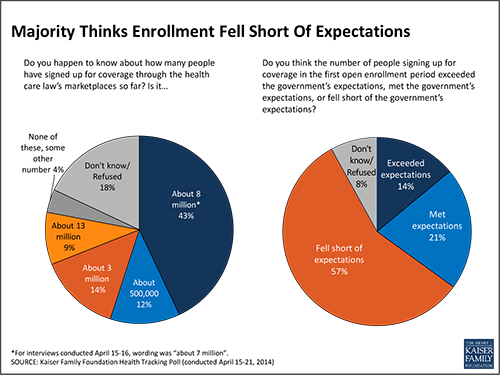
By a nearly two-to-one margin, the public supports the health law’s requirement that private health plans cover prescription birth control without cost-sharing, according to a poll released Tuesday.
The provision, which is at the heart of a case being weighed by the Supreme Court, was endorsed 61 to 32 percent and was most popular among women, younger adults, Democrats and independents, according to the Kaiser Family Foundation’s monthly tracking poll. (Kaiser Health News is an editorially independent program of the foundation.)
In addition, the poll found that 55 percent of those surveyed say that for-profit companies whose owners have religious objections to birth control should still be required to cover it. The high court is expected to rule by June on whether for-profit employers are entitled to a religious exemption from the mandate.
The poll also asked people who did not sign up for health insurance why they haven’t gotten coverage. More than a third said it was too expensive. Fourteen percent said they didn’t think the law’s requirement to get coverage or pay a fine applied to them personally, while 13 percent said they were unaware of the requirement. Twelve percent said they tried to get coverage but were unable to do so, and 7 percent said they would rather pay the fine than buy insurance. Nearly half the people did not know what the fine would be for not getting insurance.
The poll found no change in the public’s overall assessment of the law, with 46 percent holding an unfavorable view and 38 percent supporting it, unchanged from the foundation’s March poll. That said, 58 percent of those surveyed said they want their congressional representative to work to improve the law, while 35 percent want lawmakers to repeal the law and replace it with something else.
Despite a last-minute surge that boosted health law enrollment beyond initial targets, nearly six in 10 people say the number of individuals signing up for coverage fell well short of expectations. Even among those who correctly identified that 8 million people had signed up so far, roughly half believe enrollment was lower than expected. And the same share say the law is not working as intended. The poll was conducted from April 15 through 21, and President Barack Obama announced the 8 million enrollment on April 17. But the Kaiser researchers said their analysis indicates no substantive differences in opinion for interviews conducted before and after the announcement.
The Congressional Budget Office had previously projected that 7 million people would enroll in the exchanges during the law’s first year, but reduced that to 6 million after technical problems brought the federal online marketplace, healthcare.gov, to a near standstill for two months last fall.
While nearly 80 percent of Republicans said the law is not working as planned, just over a third (34 percent) of Democrats held that view.
The poll was conducted among 1,504 adults ages 18 and older. The margin of error for questions of the overall public is +/- 3 percentage points.